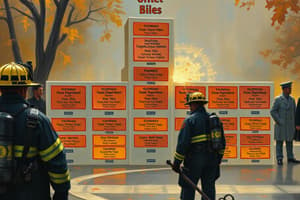Podcast
Questions and Answers
What factors affect the operational capabilities of smaller fire departments?
What factors affect the operational capabilities of smaller fire departments?
- Budget and location
- Staffing, experience, training, and resources (correct)
- Number of fires per year and community size
- Availability of equipment and technology
What is one question that applicants are asked during the hiring process for fire departments?
What is one question that applicants are asked during the hiring process for fire departments?
- Are you willing to work overtime?
- Are you willing to take significant risks to save lives? (correct)
- Are you willing to relocate for the job?
- Are you willing to work weekends?
What must fire chiefs consider when deciding whether or not to allow applicants who are not willing to take significant risks into the organization?
What must fire chiefs consider when deciding whether or not to allow applicants who are not willing to take significant risks into the organization?
- The potential backlash from city leadership or the public (correct)
- The applicant's previous work experience
- The applicant's education level
- The applicant's physical fitness level
What should the fire service do prior to events to ensure training is conducted on acceptable levels of aggression and reckless behavior?
What should the fire service do prior to events to ensure training is conducted on acceptable levels of aggression and reckless behavior?
Who determines the purpose and value of the fire department?
Who determines the purpose and value of the fire department?
What are the three infrastructures identified for understanding, responsibility, and accountability throughout the organization?
What are the three infrastructures identified for understanding, responsibility, and accountability throughout the organization?
What does the chosen culture infrastructure include?
What does the chosen culture infrastructure include?
What does the intellectual infrastructure focus on?
What does the intellectual infrastructure focus on?
What does the support infrastructure provide for the other two critical infrastructures?
What does the support infrastructure provide for the other two critical infrastructures?
What did the project focused on organizational outcomes for a fire department identify?
What did the project focused on organizational outcomes for a fire department identify?
What is emphasized in the text regarding the importance of organizational culture?
What is emphasized in the text regarding the importance of organizational culture?
Flashcards are hidden until you start studying
Study Notes
- New and smaller fire departments have different perceptions of their operational capabilities based on staffing, experience, training, and resources.
- During the hiring process, applicants are asked about their willingness to take risks to save lives, and some admit they are not willing to take significant risks.
- Fire chiefs must decide whether or not to allow such applicants into the organization, considering the potential backlash from city leadership or the public.
- The fire service should have discussions prior to events to ensure training is conducted on acceptable levels of aggression and reckless behavior.
- The community determines the purpose and value of the fire department, and the fire chief has a responsibility to do the most with what taxpayers have provided.
- Three infrastructures were identified for understanding, responsibility, and accountability throughout the organization: chosen culture, intellectual support, and support infrastructure.
- The chosen culture infrastructure includes vision, core values, and leadership.
- The intellectual infrastructure focuses on hiring good people, providing feedback, supervising effectively, and offering training and professional development programs.
- The support infrastructure provides the backbone for the other two critical infrastructures and includes standard operating guidelines, preparedness standards, and support functions such as fleet maintenance and logistics.
- The project identified the elements and influences directly tied to the success and survival of TCFDD.
- The text discusses the completion of a project focused on organizational outcomes for a fire department.
- The desired outcomes are listed as taking care of people, preventing and solving problems, and managing risks.
- The fire company is identified as the key element for success and survival.
- The importance of organizational culture is emphasized, with a focus on valuing and managing it.
- The author has extensive experience in leadership and fire department organizations.
- The understanding of culture in the fire service is described as vague.
- The author believes that culture is extremely relevant in fire department organizations.
- The text encourages fire departments to invest in their organization and draw their own conclusions.
- The upcoming chapters will focus on building a fire company that provides the greatest hope for success and survival.
- The text emphasizes the importance of investing in preparedness, training, and operational capabilities.
Studying That Suits You
Use AI to generate personalized quizzes and flashcards to suit your learning preferences.





